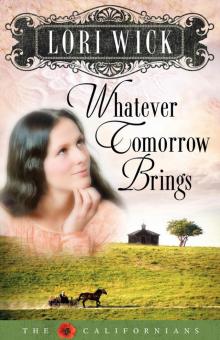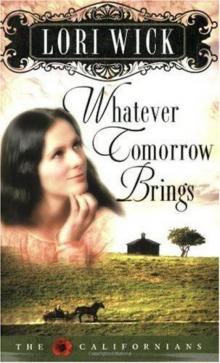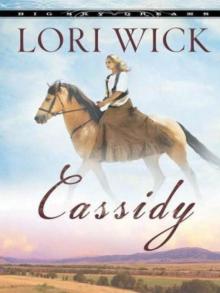Whispers of Moonlight Read online
Cover by Terry Dugan Design, Minneapolis, Minnesota
Cover photo © Daryl Benson/The Image Bank/Getty Images
This is a work of fiction. Names, characters, places, and incidents are products of the author’s imagination or are used fictitiously. Any resemblance to actual persons, living or dead, or to events or locales, is entirely coincidental.
WHISPERS OF MOONLIGHT
Copyright © 1996 by Lori Wick
Published by Harvest House Publishers
Eugene, Oregon 97402
www.harvesthousepublishers.com
Library of Congress Cataloging-in-Publication Data
Wick, Lori.
Whispers of moonlight / Lori Wick.
p. cm. — (Rocky Mountain memories)
ISBN-13: 978-0-7369-1819-0
ISBN-10: 0-7369-1819-1
1. Frontier and pioneer life—Rocky Mountains Region—Fiction. 2. Man—woman relationships—Rocky Mountains Region—Fiction. I. Title. II. Series: Wick, Lori. Rocky Mountain memories series.
PS3573.I237W488 1996
813'.54—dc20 96-20622
CIP
All rights reserved. No part of this publication may be reproduced, stored in a retrieval system, or transmitted in any form or by any means—electronic, mechanical, digital, photocopy, recording, or any other—except for brief quotations in printed reviews, without the prior permission of the publisher.
Printed in the United States of America
06 07 08 09 10 11 12 13 / BC / 10 9 8 7 6 5 4 3 2 1
To Betty Fletcher, LaRae Weikert,
Julie Castle, and all the Harvest House family.
You have turned my dreams into reality. You have
given wings to the stories in my mind and even
been the wind beneath them. This dedication
comes with my love and deepest thanks.
Contents
Acknowledgments
About the Author
Prologue
1
2
3
4
5
6
7
8
9
10
11
12
13
14
15
16
17
18
19
20
21
22
23
24
25
26
27
28
29
30
31
32
33
34
35
36
37
38
39
40
41
42
43
44
45
46
47
48
Epilogue
Books by Lori Wick
Harvest House Publishers
Acknowledgments
So many people go into the writing of every book, and this book is no exception. There are many who touch my world and make me the person and the writer I am. I would like to mention just a few.
Thank you, Carol Middleton, for the friendship you show me. The miles between us don’t make any difference. I can feel your love for me no matter where I am. I thank God for you.
Thank you Todd and Becki Barsness. Thank you for the song, but more so for the love you have shown to Bob and me. I praise God for your example in word and deed. You are precious to us.
And to Eoline Hayes, my paternal grandmother. It was wonderful to know you were so proud of me. Hard as it was to see you go, I’m so thankful we had you for 88 years. The reunion in heaven with your sons must have been the sweetest of all.
I also wish to thank my father, who died during the writing of this book. We were closer than ever when God called you home, but I don’t think I ever thanked you for the special care you gave to Mom, or told you what it did to my heart to see you smile and caress my cheek. Nothing could have prepared me for the way I would miss you, but I’m so thankful that you’re in on that heavenly reunion as well. If the Lord gives you reports on how we’re doing, Dad, I hope He can say of me that I’ve been faithful.
And finally to Bob, at times my toughest critic but also my strongest support. I have no Scripture to back it up, but there must be a special crown for husbands whose wives are authors. Thanks for being there and never wavering in your love for me or the Lord.
About
the Author
LORI WICK is one of the most versatile Christian fiction writers in the market today. Her works include pioneer fiction, two series set in England, and contemporary novels. Lori’s books (more than 5 million copies in print) continue to delight readers and top the Christian bestselling fiction list. Lori and her husband, Bob, live in Wisconsin and are parents of “the three coolest kids in the world.”
Prologue
Philadelphia, Pennsylvania
1859
“I’m going, Hannah, and that’s my final word.”
“But why, Andrew? I don’t understand.”
Brother and sister, one angry and the other confused, eyed each other across the formal parlor, a dark room to begin with and made even more dim by the blue glass lantern.
“I can’t explain it,” he said in a low voice, “but the time is right. I feel it. As soon as I’m established, I’ll send for my girl.”
Hannah’s hand fluttered around the lace at her throat and then went to the gray curls at her temple, her voice dropping to a whisper. “The talk, Andrew. What if there really is a war?”
The older sibling watched her brother’s face flush with rage. “You’ll not talk like that, do you hear me? There will be no war. Are we animals, Hannah? Brother fighting against brother? Preposterous! I’ll hear no more about it.”
But his sister wasn’t cowed. Her chin rose even though her eyes filled with tears.
“If you’re wrong, Andrew, you’ll be cut off from Rebecca. That little girl whose mother hasn’t been dead six months and who worships the ground you walk on will be hundreds of miles away with no way to reach you. She may never see you again.”
All the fight went out of him. Andrew sank heavily into a chair, his hand to his brow. He was not an old man, just over 40, but suddenly he felt ancient. Indeed, nothing else his sister could say would have touched him more. He adored his eight-year-old daughter, but if he didn’t go west now, he might never get the chance. He believed he could make a wonderful life for both of them, if only he had the opportunity. He had waited years for his now-dead wife’s health to improve and felt sure that if he didn’t go now, he never would.
“My mind’s made up, Hannah.” His voice was quiet yet resolute. “I’m asking you to keep Reba and see to her schooling. When the time is right, I’ll send for her. I promise to write her every week, but I’ve got to do this.”
Hannah took a deep breath, knowing she was going to have to accept the inevitable. She guessed she should be happy that he wasn’t taking Rebecca with him, but Hannah dreaded the girl’s tears and misery when her father left. Her own husband, Franklin Ellenbolt, was a tolerant husband and uncle, but so preoccupied with business that he would never have time for a lonely niece, no matter how precious.
“All right, Andrew, I’ll do this,” she agreed, “but you need to plan on sending for her no more than six months after you arrive.”
The man nodded. “Yes, I think you’re right. It will feel like forever as it is. If all goes according to plan, the timing shouldn’t be a problem. Keep your eyes and ears open for someone to accompany her. Unless you think—”
Hannah shook her hea
d. “Franklin would never agree, Andrew, and I’m getting too old to be running across the country.”
Andrew stood. He would not press her further. “I’ll tell Reba in the morning that I’m leaving at the end of the week. That way she’ll have a few days to come to grips with the idea.”
Hannah’s throat felt tight. The end of the week. Four days from now. How would they survive it? How would the little girl sleeping in the next room respond? Rebecca Wagner was the sweetest little girl Hannah had ever known. But then sweet little girls were not always well taken care of. Hannah knew that firsthand.
The 50-year-old aunt had a sudden premonition. Her heart told her at that moment that all would not be well in the days to come. Andrew refused even to discuss the war, but Hannah was not so optimistic. Somehow she knew in her heart that Andrew would not send for Rebecca in six months. Along with this thought rose a fierce protectiveness: Rebecca’s Aunt Hannah was going to take care of her. Having no children of her own, she determined then and there that her niece would never want for anything as long as Hannah was alive. She knew she could never share this with her brother, but in moments Hannah had convinced herself that even if Andrew did send for her, Rebecca would never want to leave.
A door sounded in the other room, and Hannah knew that Franklin was finally home from the office. It was after 9:00, and he would be hungry. Andrew was headed toward the stairs and presumably bed. Hannah determined to tell Franklin of her plans, even if it ruined his dinner.
1
Boulder, Colorado Territory
1870
The tall cowboy and his buckskin mount drew eyes from up and down the street as he rode into town and stopped in front of the bar. He looped the horse’s reins over the rail and worked to push Texas from his mind. No easy task. All the towns in every state he’d crossed since May sported the same sad little cemeteries, starkly reminding him of his mother’s freshly dug grave. For years, while his mother was alive, he felt imprisoned in Texas, but now that she was dead, his only thought was to get as far away as quickly as he could.
Not able to remember even half the places he’d been, he now found himself in a small town in the Colorado Territory—Boulder. It was no different from anything else he’d seen. Outside of the church and graveyard, he could see two hotels, a post office, a barber shop, hardware and general stores, and a varied selection of wooden and brick houses. Nothing very special to his mind, but it was already late summer, and he knew if he didn’t get settled into work soon, he’d be hungry and cold come winter.
The barroom doors swung open without a sound as he passed into the smoky interior, which he found rather crowded for midday. Small tables with mismatched chairs dotted the room, and without glancing at anyone he moved to a seat at an empty table, one that placed his back to the wall. A moment later, a rotund man in an apron approached.
“What’ll it be?” a kind voice inquired.
Hat still in place, the cowboy tipped his head back just enough to order his drink. He would have preferred a tall glass of water, and had he been thinking, would have gone to one of the hotels where such a request would have been common.
“You want the bottle?” he was asked when the drink appeared a minute later.
“No,” he said shortly, but without heat.
He reached for the glass, keeping his eyes on his own table and drink, but he had already attracted the attention of several patrons, one of whom was bold enough to approach. His name was Lucky Harwell. Just 17 and feeling quite proud of himself this day, he stood and began to saunter over to the stranger’s table.
Lucky worked at the Double Star Ranch. His boss, Andrew Wagner, had known he was headed to town and asked him to keep an eye out for new hands. Lucky, as wet behind the ears as they came, was feeling so pleased with his task that he would have approached a known outlaw. The solitary man at the table looked a bit menacing, but Lucky wanted to return to the ranch and say he’d tried.
“Mind if I join ya?”
The head tipped way back this time because Lucky was taller than average, which gave the young man even more confidence.
“Depends on your business,” the cowboy replied.
“Work. I wondered if you’ve ever worked a cattle ranch.”
The chair opposite the seated man instantly slid out and bumped against Lucky’s legs. Lucky had to hide a look of awe. He’d never seen such a smooth move; in fact, he hadn’t seen that one, but he swiftly recovered and sat down.
“Who are you?” the other man asked before he could say a word.
“Lucky Harwell. I work at the Double Star Ranch, and my boss is looking for hands.” He stopped, waiting for the man to show some interest, but received only a stare. The owner of the Double Star had not said much about the position, but Lucky hated to admit this. For some reason he wanted to bring this man back to Mr. Wagner.
“The hands sleep in the bunkhouse.” He leaned forward as he spoke. “It’s pretty clean, and you have your own bunk. Umm, we have days off, and the cattle drives aren’t as long as some I’ve heard about.” He couldn’t say that he’d ridden on any, because the Double Star was his first job. He recognized that he was starting to babble and made himself stop. His expression became slightly mutinous, and his chin rose slightly. He was surprised when the other man put his hand out. Lucky shook it without thinking.
“I’m Travis Buchanan,” the deep voice told him. “I’d hate to ride all the way to this ranch if your boss isn’t really looking for men.”
“He is,” Lucky told him, all enthusiasm returning. “He talked to me about it just today.”
“How many cattle you running?”
“Fifteen hundred head.”
“What direction is this ranch?”
“North. Straight out through the center of town and then to the left at the fork in the road.” Again, his age and excitement showed on his face and in his movements.
“Well, I’ll have to ride out there. Who do I ask for?”
“Grady. He’s foreman. Or Mr. Wagner if he’s around.”
Travis nodded and moved to stand. Lucky saw his intentions and shot up ahead of him. He enjoyed being taller than most men, and the girls liked it too. He didn’t want to be caught sitting down. He was certain that if Travis saw how tall he was, he’d also recognize his importance at the Double Star. Unfortunately, his view of Travis Buchanan from across the room had been deceiving. Travis stood to full height until he looked down at Lucky from a difference of at least five inches. Lucky’s pride in his six-foot frame all but crumbled at his feet. And if that wasn’t enough, the bartender’s daughter, Gloria, a girl he had dated a few times, was now hanging over the bar staring at Travis as though her dreams had come to life.
“Thanks for the information,” Travis said, and Lucky had to drag his attention from Gloria.
“I’ll ride with you,” Lucky managed. As disgruntled as he was with the way things had turned out, he had to be at the ranch when this man made an appearance.
Travis, who obviously felt no need for small talk, was headed toward the door. Lucky grabbed his hat and left on Travis’ heels.
“You passin’ through or here for a time?”
“That all depends on the work,” Travis told Grady.
The older man nodded. He was as impressed as Lucky had been. Travis Buchanan was clean-shaven, something he was partial to, and had a calm, professional air about him. In truth, he was foreman material, but Grady wasn’t worried about his position. He was more Andrew Wagner’s age than this new man, and the two of them thought much alike.
“You can start in the morning, if you’ve a mind to.” He named the wages and mealtimes, and Travis nodded. Lucky was lingering in the background, so Grady called on him to take Travis to the bunkhouse and show him around. From there Grady went inside to tell Andrew they had hired a new hand. He moved toward the office, but the door was shut. It was the only time the boss was not to be disturbed, so Grady left word with the housekeeper and went back out to wo
rk.
Inside the office, Andrew was sitting at the desk, his hand to his chest. The awful pain was on him again, this time so intensely that he could hardly breathe. On the desk before him was a letter from Rebecca, and he hadn’t even had the strength to open it. His breathing came hard and fast for a time, and he laid his head back on the leather chair and waited for the worst to pass. It crossed his mind, as it did often, that one of these days it was not going to pass. This time the thought drove him to prayer.
“If You’re really up there, God,” he began, “please bring Reba to me. I need her here. I need to show her the ropes, so this ranch won’t go to pieces when I’m gone. In the past it’s been my fault that she’s not here, but now Hannah has lost her mind, God. I know it. She’s keeping my girl from me. I’ll make a deal with You. If you get Reba here, I’ll go to church every week. I promise I will.”
Another pain gripped him and he couldn’t think for a time. When it finally receded, he had a terrible headache but still thought of Rebecca’s letter. He opened it with a shaky hand, laid his head back again, and read.
It’s dreadfully hot here, Papa. I envy you the cool of the mountains. The sentence made Andrew’s heart leap, since she had stopped asking to come over a year ago. His hopes were dashed on the next line.
I’m off with friends to the lake this weekend. Marcus will be with us. I told you about him. He lost his arm in the war. I’ve never met anyone like him. He has such a natural humor. I know he’ll have us laughing every minute.
Andrew couldn’t read anymore. Clearly she had made a life for herself. How many years had she asked to join him, and he had put her off? It had taken so much longer to settle than he had anticipated. And then the war. Travel had been out of the question. The war had been over for five years, and indeed, he had finally made a home for them.
He had considered sending someone from Boulder to Philadelphia in order to fetch her, but he could tell from Hannah’s overprotective letters that she would never allow it. It really was his fault that she wasn’t with him already. He’d been a fool concerning the political situation—even Lincoln had been shot—and even more of a fool that he’d wanted Rebecca to come only if she could live in the lap of luxury. Now he was ready to have his daughter join him in one of the most beautiful homes in the state, but his declining health made him helpless to do anything toward getting her there. In the past all of his letters concerning the situation had been to Hannah, but Andrew now wondered if he shouldn’t tell Rebecca to make plans herself.

 A Texas Sky
A Texas Sky The Rescue
The Rescue To Know Her by Name
To Know Her by Name Wings of the Morning
Wings of the Morning White Chocolate Moments
White Chocolate Moments Sean Donovan
Sean Donovan The Proposal
The Proposal Beyond the Picket Fence
Beyond the Picket Fence Every Little Thing About You
Every Little Thing About You City Girl
City Girl Whatever Tomorrow Brings
Whatever Tomorrow Brings A Gathering of Memories
A Gathering of Memories Just Above a Whisper
Just Above a Whisper Jessie
Jessie Sophie's Heart
Sophie's Heart Lori Wick Short Stories, Vol. 1: Be Careful With My Heart, the Haircut
Lori Wick Short Stories, Vol. 1: Be Careful With My Heart, the Haircut Cassidy
Cassidy The Long Road Home
The Long Road Home The Visitor
The Visitor Whispers of Moonlight
Whispers of Moonlight Who Brings Forth the Wind
Who Brings Forth the Wind Lori Wick Short Stories, Vol. 4: The Rancher's Lady
Lori Wick Short Stories, Vol. 4: The Rancher's Lady The Hawk and the Jewel
The Hawk and the Jewel Lori Wick Short Stories, Vol. 3: An Intense Man, the Camping Trip
Lori Wick Short Stories, Vol. 3: An Intense Man, the Camping Trip Leave a Candle Burning
Leave a Candle Burning Promise Me Tomorrow
Promise Me Tomorrow Bamboo & Lace
Bamboo & Lace Every Storm
Every Storm The Knight and the Dove
The Knight and the Dove The Princess
The Princess Lori Wick Short Stories, Vol. 2: Beyond the Picket Fence
Lori Wick Short Stories, Vol. 2: Beyond the Picket Fence A Song for Silas
A Song for Silas Pretense
Pretense Lori Wick Short Stories, Christmas Special
Lori Wick Short Stories, Christmas Special Where the Wild Rose Blooms
Where the Wild Rose Blooms The Princess Special Edition
The Princess Special Edition As Time Goes By
As Time Goes By Lori Wick Short Stories, Vol. 2
Lori Wick Short Stories, Vol. 2 Every Little Thing About You (Yellow Rose Trilogy 1)
Every Little Thing About You (Yellow Rose Trilogy 1) Whatever Tomorrow Brings (The Californians 1)
Whatever Tomorrow Brings (The Californians 1) The Hawk and the Jewel (Kensington Chronicles 1)
The Hawk and the Jewel (Kensington Chronicles 1) A Texas Sky (Yellow Rose Trilogy)
A Texas Sky (Yellow Rose Trilogy) Who Brings Forth the Wind (Kensington Chronicles)
Who Brings Forth the Wind (Kensington Chronicles) Cassidy (Big Sky Dreams 1)
Cassidy (Big Sky Dreams 1) Lori Wick Short Stories, Vol. 3
Lori Wick Short Stories, Vol. 3 Jessie (Big Sky Dreams 3)
Jessie (Big Sky Dreams 3) Sabrina (Big Sky Dreams 2)
Sabrina (Big Sky Dreams 2) Lori Wick Short Stories, Vol. 1
Lori Wick Short Stories, Vol. 1 Sabrina (Big Sky Dreams)
Sabrina (Big Sky Dreams) A Place Called Home (A Place Called Home)
A Place Called Home (A Place Called Home) City Girl (Yellow Rose Trilogy 3)
City Girl (Yellow Rose Trilogy 3) As Time Goes By (The Californians 2)
As Time Goes By (The Californians 2) A Place Called Home (A Place Called Home 1)
A Place Called Home (A Place Called Home 1) Lori Wick Short Stories, Vol. 4
Lori Wick Short Stories, Vol. 4 Wings of the Morning (Kensington Chronicles)
Wings of the Morning (Kensington Chronicles) Beyond the Picket Fence: And Other Short Stories
Beyond the Picket Fence: And Other Short Stories